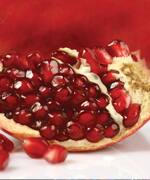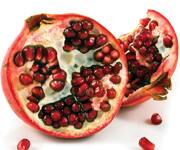Life Extension Magazine®
Despite billions being spent each year on coronary artery stents, bypass surgeries and statin drugs, heart disease remains the number one killer of Americans.1 While much of the initial research into pomegranate’s extensive health benefits focused on its juice, exciting findings reveal the multi-modal actions of pomegranate’s other components, including the juice, flower, leaves, and seed oil.2,3,5 How PON1 Can Save Your LifeIn the past five years, researchers from around the world have discovered how the various constituents of the pomegranate all work together to offer protection from a spectrum of inflammatory conditions as varied as heart disease, arthritis, cancer, diabetes, oral health, and genito-urinary tract diseases.4,5 Increasingly, research is targeting the application of pomegranate extracts for their ability to reduce the risk of cardiovascular disease. Pomegranate extracts accomplish this effect through multiple pathways. One of the most intriguing pathways is pomegranate’s ability to raise blood levels of beneficial high-density lipoprotein (HDL) cholesterol, something few other therapeutic strategies can accomplish. Raising HDL cholesterol is a proven means to reduce your cardiovascular risk.3,4 We know that higher levels of HDL are associated with reduced risk for cardiovascular disease such as heart attack or stroke, but how does HDL actually produce these favorable effects on your body? The answer lies with a group of medium-sized enzymes called the paraoxonases, which form a part of the HDL cholesterol particle.7 Paraoxonases exert powerful antioxidant effects not only on the fats contained in the HDL particle, but also on the dangerous low-density lipoprotein (LDL) cholesterol.2,8,9 Oxidized LDL is largely responsible for the creation of arterial plaques and the inflammatory response that ultimately blocks arteries and triggers deadly vascular events.10 Increasing levels of paraoxonase-containing HDL protects your tissues from deadly LDL oxidation.9 Enhancing PON1 (paraoxanase-1) activity in blood increases the antioxidant powers of beneficial HDL cholesterol, and increases the concentration of HDL in the blood.4 PON1 slows the maturation of the inflammatory cells (macrophages) that accumulate oxidized LDL to set up arterial plaque formation.11 Pomegranate extracts offer a potent means of increasing paraoxonase activity.12-14. Similarly, treatment with the main pomegranate polyphenol known as punicalagin, reduced triglyceride synthesis by as much as 40%.15 Let’s turn now to the practical impact of all this biochemistry on your body, to learn how pomegranate extracts can extend your life by preserving your cardiovascular health. Pomegranate’s Powerful Cardioprotective Effects
Increased oxidative stress is both a cause and a consequence of atherosclerosis. Conditions such as diabetes and obesity only serve to worsen the impact of oxidative stress on your body’s protective mechanisms.8,13 Boosting your body’s paraoxonase function and enhancing its HDL content with pomegranate extracts produces many important reductions in cardiovascular risks.16 One of the main causes that leads to atherosclerosis is development of an abnormal lipid profile. Typically, if your blood test shows a rise in LDL cholesterol and triglycerides and a drop in HDL levels, you are on the road to atherosclerosis. In one study, fifty-one patients with abnormal lipid profiles consumed 400 mg of pomegranate seed oil twice daily for four weeks.17 By the end of the trial, not only were their triglyceride levels lower by 62 mg/dL, but their HDL cholesterol levels had risen by more than 5 mg/dL; control patients’ beneficial HDL levels fell. When diabetic patients with abnormal lipid profiles consumed 40 grams/day of concentrated pomegranate juice, their total and LDL cholesterol levels fell significantly, as did the ratios of those lipids to beneficial HDL cholesterol.18 Importantly, urinary markers of oxidative stress and inflammation also fell significantly in supplemented patients, but not in controls. Pomegranate seed oil, administered to patients with disturbed lipid profiles for four weeks, also significantly reduced blood triglyceride levels.17 Pomegranate extracts repair damage caused by oxidized LDL cholesterol, the main culprit in early atherosclerosis development. Oxidized LDL is highly inflammatory, and it decreases important cellular protective functions, leaving you open to blood vessel damage. For example, oxidized LDL reduces activity of protective endothelial nitric oxide synthetase (eNOS); treating cells with pomegranate juice before exposing them to oxidized LDL restores normal eNOS levels.19,20 Even people with pre-existing cardiovascular disease can benefit from supplementing with pomegranate extracts. A group of 45 patients with ischemic coronary heart disease (angina or history of heart attack) was given pomegranate juice (240 ml/day) or a placebo drink for three months.21 Subjects underwent a single-positron emission computed tomography (SPECT) scan that evaluated how well their hearts were being perfused with blood; they also performed exercise stress testing. The pomegranate-supplemented patients had a significant reduction of 0.8 points on a standardized 4-point ischemia score, while control patients saw an increase of 1.2 points.
When cardiac ischemia proceeds too far, heart muscle cells begin to die, causing a heart attack or myocardial infarction. Animal studies show that pre-treatment with pomegranate extracts can protect cardiac cells from death that arises from excessive adrenaline-like compounds and from damage by the potent oxidant-inducing chemotherapy drug doxorubicin.22,23 In both cases, pomegranate extracts prevented EKG abnormalities and elevation of serum markers of heart muscle injury. Underlying heart disease and stroke is the dysfunction of your arteries’ lining layer, the endothelium. Endothelial cells are powerful regulators of blood flow, and in health they are a first line of defense against plaque formation. Under continuous assault, however, from oxidant stress and inflammation, endothelial cells begin to malfunction, losing their blood flow and pressure-regulating abilities; this change constitutes the earliest stage of atherosclerosis.24 It’s hardly surprising that PON1 activity, which reflects serum antioxidant activity, should be closely correlated with endothelial function. Studies show that as PON1 activity declines with age, endothelial function worsens, atherosclerosis increases, and the ability for the heart and brain to supply themselves with oxygen and nutrients deteriorates accordingly.24-27 Given the ability of pomegranate extracts to enhance PON1 enzyme activity in the body, one might expect that pomegranate would have favorable effects on endothelial function, thereby reducing your risk of atherosclerosis and its consequences. There’s strong evidence for just such cause and effect.28 Adolescents with metabolic syndrome represent a new and challenging group of people with obesity- and diabetes-induced endothelial dysfunction and a high risk for cardiovascular problems. A pair of studies in this population points to the potent effects of pomegranate extracts as protectors of the blood vessel lining. Obese teens with metabolic syndrome were given pomegranate juice supplements daily for one month, and their blood levels of oxidants and inflammatory markers were followed. In addition, the overweight adolescents underwent testing of their endothelial function through measurement of their arteries’ ability to regulate blood flow. After just four hours, there was significant improvement in that measurement in the supplemented group.29 That improvement persisted after the full month of supplementation, as did significant reduction in serum markers of inflammation, another important predictor of long-term arterial function.30 These studies reveal how pomegranate extracts can improve vascular health and lower your risk for heart disease and stroke through their PON1-boosting effects. Pomegranate extracts’ cardiovascular benefits don’t stop at early prevention of atherosclerosis. A steady thickening of vital arteries throughout the body is an indication of moderately advanced atherosclerosis. Measured by ultrasound, it is a useful measure of one’s risk for heart attack or stroke. A study of adults 45 to 74 years old with one or more major heart disease risk factors showed that consumption of pomegranate juice, 240 ml/day, for 18 months reduced progression of arterial wall thickening among patients with the highest degree of oxidative stress and the most severe disturbances in their lipid profiles.31 Thickened, plaque-ridden arteries are targets for a blood clot which is often the final event leading to a stroke or heart attack. When blood platelets stick together they form clots. Pomegranate juice, and especially whole pomegranate extract, reduce platelet “stickiness” through suppressing several different aggregation factors.32
Pomegranate Extracts Fight Diabetic ComplicationsDiabetes is another condition in which oxidant stress is a major factor as both a cause and a consequence.10 Compared with healthy people, diabetics have sharply lower levels of PON1, and frequently have resulting reductions in their HDL cholesterol levels; this is one cause for their high rate of cardio- vascular complications.10,13,33 In addition, diabetics are in a constant struggle against weight gain and inflammation, both of which further impair their ability to control blood sugar levels. Pomegranate extracts offer multiple ways to battle the impact of diabetes. They increase the degree to which PON1 binds to HDL particles, enhancing their antioxidant function.13 In turn, this enhances pancreatic insulin release and reduces obesity-related insulin resistance.34,35 One means by which pomegranate extracts enhance insulin sensitivity is by suppressing secretion of resistin, the compound recently discovered to be the link between obesity and type 2 diabetes.36 Pomegranate extracts may become an essential part of the fight against obesity itself. Animals fed a high-fat diet and supplemented with pomegranate extracts show reduced total body and liver fat accumulation, along with significant reductions in body weight.35,37,38 These effects are also attributed to PPAR activation by pomegranate, as well as to other biochemical events.39 Human diabetics supplemented with pomegranate saw their weight levels plateau, rather than continuing to rise over time as did unsupplemented control patients.40 Since all of us develop some degree of insulin resistance with aging, it is worth noting a study that demonstrated improvements in age-related insulin resistance even in non-diabetic animals.41 That study also revealed a reduction in abdominal fat stores, a known cardiovascular risk factor. Just as in non-diabetic people, pomegranate extracts improve diabetics’ lipid profiles by lowering LDL and total cholesterol, while raising beneficial HDL levels.18,33 Pomegranate extracts reduce the sometimes massively elevated levels of serum oxidant markers in diabetics, increasing their cellular antioxidant systems, and markedly reducing uptake of oxidized LDL by macrophages.10 Together these effects can reduce the risk of a diabetes-related cardiovascular event. Diabetics can realize other benefits from pomegranate supplementation as well. The extracts can prevent hypertension through reduced oxidative stress and inhibition of angiotensin-converting enzyme (ACE), which stimulates higher blood pressure.42,43 And, while learning and memory are impaired in diabetic animals, pomegranate supplementation restores cognitive performance on a maze test, an observation that has important bearing on human diabetics.44 Pomegranate Extracts Increase Your Freedom to Move
Osteoarthritis and rheumatoid arthritis are two quite different conditions with a common presentation, namely joint pain, swelling, and reduction in movement. People with arthritis are substantially less likely to be able to exercise, which adds to the already elevated risk of heart attack and stroke in these populations.45-49 Fortunately, pomegranate extracts are a promising therapy for both conditions. Osteoarthritis is the most common form of arthritis. It is caused by a steady degradation of the vital cartilage cushion that protects and lubricates joints. Animal studies now show that supplementation with pomegranate juice can prevent experimentally-induced osteoarthritis, reducing damage to cartilage.50 Other studies suggest that this effect is the result of inhibition by pomegranate polyphenols of the biochemical signaling pathways that trigger cartilage loss and inflammation.6,51 Rheumatoid arthritis carries with it an increased risk of atherosclerosis and cardiovascular diseases.48,49 People with rheumatoid arthritis have decreased levels of PON1 in their blood, limiting their ability to fight off dangerous lipid oxidation that promotes inflammation.47,52 Pomegranate’s PON1-restoring capabilities make it an appealing therapy in rheumatoid arthritis. Animals supplemented with pomegranate extracts before induction of experimental rheumatoid arthritis have a delayed onset and lower incidence of the disease; their joints also show less severe inflammatory destruction.53 In a study of those with rheumatoid arthritis who took a pomegranate extract for 12 weeks, they showed a significant reduction in their disease activity, mainly the result of a reduction in the number of tender joints.54 These impressive results were accompanied by a significant increase in PON1 and reduction in markers of oxidation. Additional Benefits of PomegranateOur growing understanding of the molecular mechanisms of action of pomegranate fruit, juice, and extracts is revealing a host of benefits in addition to those we’ve discussed. Here is a brief synopsis of some of what we are learning, and a hint of what the future will bring. Pomegranate extracts are proving their usefulness in laboratory models of multiple forms of cancer. Thus far, cancers of the breast, lung, colon, liver, skin, and prostate have yielded in one way or another to pomegranate’s multi-targeted mechanisms of action.55-60 For example, pomegranate extracts slow cancer cell proliferation while increasing the rate at which cancer cells kill themselves through the programmed cell death process known as apoptosis.61-64 Pomegranate extracts also inhibit the rate of cancerous invasion and spread by metastasis, processes which are ultimately responsible for death in a majority of cancer patients.65,66 And, in certain sex hormone-dependent cancers such as those of the breast and prostate, pomegranate has shown its ability to inhibit both the enzymes that produce sex hormones, and the cellular receptors for those hormones on cancer cells.67-69 Finally, pomegranate extracts can sensitize breast cancer cells to the chemotherapy agent tamoxifen, potentially allowing the use of lower doses of the drug.70 Together, these capabilities may make these common and widely-feared cancers more tractable to treatment than does conventional therapy. The most dramatic example of pomegranate’s cancer-fighting effects comes from a study of prostate cancer in humans. Men who had undergone surgery or radiation therapy for their cancers were followed to determine the rate of rise of the cancer-marking chemical called prostate-specific antigen, or PSA.71 The rate at which PSA levels double is a useful predictor of the rate of progression of the disease following treatment. At baseline, the rate of PSA doubling time was 15 months; with pomegranate supplementation that rate slowed dramatically to 54 months, a remarkable improvement. Pomegranate has benefits related to oral health as well, specifically in controlling the dangerous dental plaque that leads to the gum disease gingivitis.72 Extracts of pomegranate kill the germs involved in plaque formation.73 Studies of pomegranate extracts used as oral rinses, or applied directly to diseased gums, show up to an 84% reduction in dental plaque organisms, a reduction in inflammatory markers in saliva, and dramatic improvements in the way the gum tissue attaches to teeth.72-76 Finally, there is a small but growing body of evidence that pomegranate extracts may be helpful in preventing or treating various disorders of the urinary and genital tracts. Animal studies suggest that the extracts enhance sperm production through their antioxidant effects.77,78 Others show protection against dangerous kidney stone development.79 And there’s encouraging evidence that the extracts can prevent prostatitis, an irritaing prostate condition that causes misery to many older men.80 Laboratory and a few human studies have now shown that pomegranate extracts kill the organism Trichomonas vaginalis, a common cause of vaginitis in reproductive-aged women.81,82 While not deadly, Trichomonas infections cause considerable annoyance and discomfort to millions of women, and conventional drug treatment is increasingly ineffective and fraught with side effects. SummaryMany people are catching on to the substantial health benefits of the pomegranate. Unfortunately, those who are consuming only commercial pomegranate juice are missing out on many other beneficial parts of the plant, such as the leaves, flowers, and oil from the seeds. Each component of pomegranate works together synergistically to maximize its beneficial effects on your health. Pomegranate extracts increase production of the vital paraoxonase enzymes that give HDL cholesterol its good name, helping it to fight the oxidative and inflammatory damage that leads to atherosclerosis. By lowering LDL and raising HDL cholesterol, pomegranate extracts directly reduce cardiovascular disease risk. The extracts also improve insulin sensitivity and glucose control, making pomegranate a versatile nutrient to supplement with. While some people enjoy pomegranate juice, we caution that it naturally contains more fructose than desirable for most individuals. Standardized pomegranate extracts supply the beneficial polyphenols without the sugar. If you have any questions on the scientific content of this article, please call a Life Extension® Health Advisor at 1-866-864-3027. |
|||||||||
| References | |||||||||
|
1. Available at: http://www.cdc.gov/heartdisease/facts.htm. Accessed March 9, 2012. 2. Soran H, Younis NN, Charlton-Menys V, Durrington P. Variation in paraoxonase-1 activity and atherosclerosis. Curr Opin Lipidol. 2009 Aug;20(4):265-74. 3. Cui Y, Watson DJ, Girman CJ, et al. Effects of increasing high-density lipoprotein cholesterol and decreasing low-density lipoprotein cholesterol on the incidence of first acute coronary events (from the Air Force/Texas Coronary Atherosclerosis Prevention Study). Am J Cardiol. 2009 Sep 15;104(6):829-34. 4. Regieli JJ, Jukema JW, Doevendans PA, et al. Paraoxonase variants relate to 10-year risk in coronary artery disease: impact of a high-density lipoprotein-bound antioxidant in secondary prevention. J Am Coll Cardiol. 2009 Sep 29;54(14):1238-45. 5. Jurenka JS. Therapeutic applications of pomegranate (Punica granatum L.): a review. Altern Med Rev. 2008 Jun;13(2):128-44. 6. Johanningsmeier SD, Harris GK. Pomegranate as a functional food and nutraceutical source. Annu Rev Food Sci Technol. 2011;2:181-201. 7. Seo D, Goldschmidt-Clermont P. The paraoxonase gene family and atherosclerosis. Curr Atheroscler Rep. 2009 May;11(3):182-7. 8. Rosenblat M, Aviram M. Paraoxonases role in the prevention of cardiovascular diseases. Biofactors. 2009 Jan-Feb;35(1):98-104. 9. Khateeb J, Gantman A, Kreitenberg AJ, Aviram M, Fuhrman B. Paraoxonase 1 (PON1) expression in hepatocytes is upregulated by pomegranate polyphenols: a role for PPAR-gamma pathway. Atherosclerosis. 2010 Jan;208(1):119-25. 10. Rosenblat M, Hayek T, Aviram M. Anti-oxidative effects of pomegranate juice (PJ) consumption by diabetic patients on serum and on macrophages. Atherosclerosis. 2006 Aug;187(2): 363-71. 11. Rosenblat M, Volkova N, Ward J, Aviram M. Paraoxonase 1 (PON1) inhibits monocyte-to-macrophage differentiation. Atherosclerosis. 2011 Nov;219(1):49-56. 12. Rosenblat M, Volkova N, Aviram M. Pomegranate juice (PJ) consumption antioxidative properties on mouse macrophages, but not PJ beneficial effects on macrophage cholesterol and triglyceride metabolism, are mediated via PJ-induced stimulation of macrophage PON2. Atherosclerosis. 2010 Sep;212(1):86-92. 13. Fuhrman B, Volkova N, Aviram M. Pomegranate juice polyphenols increase recombinant paraoxonase-1 binding to high-density lipoprotein: studies in vitro and in diabetic patients. Nutrition. 2010 Apr;26(4):359-66. 14. Gugliucci A. Beyond the antioxidant properties: pomegranate juice polyphenols increase hepatocyte paraoxonase 1 secretion. Atherosclerosis. 2010 Jan;208(1):28-9. 15. Rosenblat M, Aviram M. Pomegranate juice protects macrophages from triglyceride accumulation: inhibitory effect on DGAT1 activity and on triglyceride biosynthesis. Ann Nutr Metab. 2011;58(1):1-9. 16. Rosenblat M, Volkova N, Attias J, Mahamid R, Aviram M. Consumption of polyphenolic-rich beverages (mostly pomegranate and black currant juices) by healthy subjects for a short term increased serum antioxidant status, and the serum’s ability to attenuate macrophage cholesterol accumulation. Food Funct. 2010 Oct;1(1):99-109. 17. Mirmiran P, Fazeli MR, Asghari G, Shafiee A, Azizi F. Effect of pomegranate seed oil on hyperlipidaemic subjects: a double-blind placebo-controlled clinical trial. Br J Nutr. 2010 Aug;104(3):402-6. 18. Esmaillzadeh A, Tahbaz F, Gaieni I, Alavi-Majd H, Azadbakht L. Concentrated pomegranate juice improves lipid profiles in diabetic patients with hyperlipidemia. J Med Food. 2004 Fall;7(3):305-8. 19. Ignarro LJ, Byrns RE, Sumi D, de Nigris F, Napoli C. Pomegranate juice protects nitric oxide against oxidative destruction and enhances the biological actions of nitric oxide. Nitric Oxide. 2006 Sep;15(2):93-102. 20. de Nigris F, Williams-Ignarro S, Botti C, Sica V, Ignarro LJ, Napoli C. Pomegranate juice reduces oxidized low-density lipoprotein downregulation of endothelial nitric oxide synthase in human coronary endothelial cells. Nitric Oxide. 2006 Nov;15(3):259-63. 21. Sumner MD, Elliott-Eller M, Weidner G, et al. Effects of pomegranate juice consumption on myocardial perfusion in patients with coronary heart disease. Am J Cardiol. 2005 Sep 15;96(6):810-4. 22. Mohan M, Patankar P, Ghadi P, Kasture S. Cardioprotective potential of Punica granatum extract in isoproterenol-induced myocardial infarction in Wistar rats. J Pharmacol Pharmacother. 2010 Jan;1(1):32-7. 23. Hassanpour Fard M, Ghule AE, Bodhankar SL, Dikshit M. Cardioprotective effect of whole fruit extract of pomegranate on doxorubicin-induced toxicity in rat. Pharm Biol. 2011 Apr;49(4):377-82. 24. Pasqualini L, Cortese C, Marchesi S, et al. Paraoxonase-1 activity modulates endothelial function in patients with peripheral arterial disease. Atherosclerosis. 2005 Dec;183(2):349-54. 25. Cakatay U, Kayali R, Uzun H. Relation of plasma protein oxidation parameters and paraoxonase activity in the ageing population. Clin Exp Med. 2008 Mar;8(1):51-7. 26. Irace C, Cortese C, Fiaschi E, et al. The influence of PON1 192 polymorphism on endothelial function in diabetic subjects with or without hypertension. Hypertens Res. 2008 Mar;31(3):507-13. 27. Yildiz A, Sezen Y, Gur M, Yilmaz R, Demirbag R, Erel O. Association of paraoxonase activity and coronary collateral flow. Coron Artery Dis. 2008 Nov;19(7):441-7. 28. Ghosh D, Scheepens A. Vascular action of polyphenols. Mol Nutr Food Res. 2009 Mar;53(3):322-31. 29. Hashemi M, Kelishadi R, Hashemipour M, et al. Acute and long-term effects of grape and pomegranate juice consumption on vascular reactivity in paediatric metabolic syndrome. Cardiol Young. 2010 Feb;20(1):73-7. 30. Kelishadi R, Gidding SS, Hashemi M, Hashemipour M, Zakerameli A, Poursafa P. Acute and long term effects of grape and pomegranate juice consumption on endothelial dysfunction in pediatric metabolic syndrome. J Res Med Sci. 2011 Mar;16(3):245-53. 31. Davidson MH, Maki KC, Dicklin MR, et al. Effects of consumption of pomegranate juice on carotid intima-media thickness in men and women at moderate risk for coronary heart disease. Am J Cardiol. 2009 Oct 1;104(7):936-42. 32. Mattiello T, Trifiro E, Jotti GS, Pulcinelli FM. Effects of pomegranate juice and extract polyphenols on platelet function. J Med Food. 2009 Apr;12(2):334-9. 33. Fenercioglu AK, Saler T, Genc E, Sabuncu H, Altuntas Y. The effects of polyphenol-containing antioxidants on oxidative stress and lipid peroxidation in Type 2 diabetes mellitus without complications. J Endocrinol Invest. 2010 Feb;33(2):118-24. 34. Koren-Gluzer M, Aviram M, Meilin E, Hayek T. The antioxidant HDL-associated paraoxonase-1 (PON1) attenuates diabetes development and stimulates beta-cell insulin release. Atherosclerosis. 2011 Dec;219(2):510-8. 35. Vroegrijk IO, van Diepen JA, van den Berg S, et al. Pomegranate seed oil, a rich source of punicic acid, prevents diet-induced obesity and insulin resistance in mice. Food Chem Toxicol. 2011 Jun;49(6):1426-30. 36. Makino-Wakagi Y, Yoshimura Y, Uzawa Y, Zaima N, Moriyama T, Kawamura Y. Ellagic acid in pomegranate suppresses resistin secretion by a novel regulatory mechanism involving the degradation of intracellular resistin protein in adipocytes. Biochem Biophys Res Commun. 2012 Jan 13;417(2):880-5. 37. Al-Muammar MN, Khan F. Obesity: The preventive role of the pomegranate (Punica granatum). Nutrition. 2012 Feb 16. [Epub ahead of print] 38. McFarlin BK, Strohacker KA, Kueht ML. Pomegranate seed oil consumption during a period of high-fat feeding reduces weight gain and reduces type 2 diabetes risk in CD-1 mice. Br J Nutr. 2009 Jul;102(1):54-9. 39. Xu KZ, Zhu C, Kim MS, Yamahara J, Li Y. Pomegranate flower ameliorates fatty liver in an animal model of type 2 diabetes and obesity. J Ethnopharmacol. 2009 Jun 22;123(2):280-7. 40. Gonzalez-Ortiz M, Martinez-Abundis E, Espinel-Bermudez MC, Perez-Rubio KG. Effect of pomegranate juice on insulin secretion and sensitivity in patients with obesity. Ann Nutr Metab. 2011;58(3):220-3. 41. Wang J, Rong X, Um IS, Yamahara J, Li Y. 55-week treatment of mice with the unani and ayurvedic medicine pomegranate flower ameliorates ageing-associated insulin resistance and skin abnormalities. Evid Based Complement Alternat Med. 2012;2012:350125. 42. Mohan M, Waghulde H, Kasture S. Effect of pomegranate juice on Angiotensin II-induced hypertension in diabetic Wistar rats. Phytother Res. 2010 Jun;24 Suppl 2:S196-203. 43. Aviram M, Dornfeld L. Pomegranate juice consumption inhibits serum angiotensin converting enzyme activity and reduces systolic blood pressure. Atherosclerosis. 2001 Sep;158(1):195-8. 44. Cambay Z, Baydas G, Tuzcu M, Bal R. Pomegranate (Punica granatum L.) flower improves learning and memory performances impaired by diabetes mellitus in rats. Acta Physiol Hung. 2011 Dec;98(4):409-20. 45. González-Gay MA, González-Juanatey C. Implication of new atherosclerotic carotid plaques in the cardiovascular outcome of patients with rheumatoid arthritis. Arthritis Res Ther. 2012 Mar 12;14(2):105. 46. Onat A, Direskeneli H. Excess Cardiovascular Risk in Inflammatory Rheumatic Diseases: Pathophysiology and Targeted Therapy. Curr Pharm Des. 2012 Feb 24. [Epub ahead of print] 47. Isik A, Koca SS, Ustundag B, Celik H, Yildirim A. Paraoxonase and arylesterase levels in rheumatoid arthritis. Clin Rheumatol. 2007 Mar;26(3):342-8. 48. Chung CP, Giles JT, Petri M, et al. Prevalence of traditional modifiable cardiovascular risk factors in patients with rheumatoid arthritis: comparison with control subjects from the multi-ethnic study of atherosclerosis. Semin Arthritis Rheum. 2012 Feb;41(4):535-44. 49. Yazdanyar A, Chester Wasko M, Kraemer KL, Ward MM. Perioperative all-cause mortality and cardiovascular events in patients with rheumatoid arthritis: Comparison with unaffected controls and persons with diabetes mellitus. Arthritis Rheum. 2012 Feb 21. 50. Hadipour-Jahromy M, Mozaffari-Kermani R. Chondroprotective effects of pomegranate juice on monoiodoacetate-induced osteoarthritis of the knee joint of mice. Phytother Res. 2010 Feb;24(2):182-5. 51. Khalife S, Zafarullah M. Molecular targets of natural health products in arthritis. Arthritis Res Ther. 2011;13(1):102. 52. Baskol G, Demir H, Baskol M, et al. Assessment of paraoxonase 1 activity and malondialdehyde levels in patients with rheumatoid arthritis. Clin Biochem. 2005 Oct;38(10):951-5. 53. Shukla M, Gupta K, Rasheed Z, Khan KA, Haqqi TM. Consumption of hydrolyzable tannins-rich pomegranate extract suppresses inflammation and joint damage in rheumatoid arthritis. Nutrition. 2008 Jul-Aug;24(7-8):733-43. 54. Balbir-Gurman A, Fuhrman B, Braun-Moscovici Y, Markovits D, Aviram M. Consumption of pomegranate decreases serum oxidative stress and reduces disease activity in patients with active rheumatoid arthritis: a pilot study. Isr Med Assoc J. 2011 Aug;13(8):474-9. 55. Albrecht M, Jiang W, Kumi-Diaka J, et al. Pomegranate extracts potently suppress proliferation, xenograft growth, and invasion of human prostate cancer cells. J Med Food. 2004 Fall;7(3):274-83. 56. Adhami VM, Khan N, Mukhtar H. Cancer chemoprevention by pomegranate: laboratory and clinical evidence. Nutr Cancer. 2009;61(6):811-5. 57. Khan SA. The role of pomegranate (Punica granatum L.) in colon cancer. Pak J Pharm Sci. 2009 Jul;22(3):346-8. 58. Kasimsetty SG, Bialonska D, Reddy MK, Ma G, Khan SI, Ferreira D. Colon cancer chemopreventive activities of pomegranate ellagitannins and urolithins. J Agric Food Chem. 2010 Feb 24;58(4):2180-7. 59. Bishayee A, Bhatia D, Thoppil RJ, Darvesh AS, Nevo E, Lansky EP. Pomegranate-mediated chemoprevention of experimental hepatocarcinogenesis involves Nrf2-regulated antioxidant mechanisms. Carcinogenesis. 2011 Jun;32(6):888-96. 60. George J, Singh M, Srivastava AK, Bhui K, Shukla Y. Synergistic growth inhibition of mouse skin tumors by pomegranate fruit extract and diallyl sulfide: evidence for inhibition of activated MAPKs/NF-kappaB and reduced cell proliferation. Food Chem Toxicol. 2011 Jul;49(7):1511-20. 61. Dai Z, Nair V, Khan M, Ciolino HP. Pomegranate extract inhibits the proliferation and viability of MMTV-Wnt-1 mouse mammary cancer stem cells in vitro. Oncol Rep. 2010 Oct;24(4):1087-91. 62. Gasmi J, Sanderson JT. Growth Inhibitory, Antiandrogenic, and pro-apoptotic effects of punicic acid in LNCaP human prostate cancer cells. J Agric Food Chem. 2010 Nov 10. 63. Koyama S, Cobb LJ, Mehta HH, et al. Pomegranate extract induces apoptosis in human prostate cancer cells by modulation of the IGF-IGFBP axis. Growth Horm IGF Res. 2010 Feb;20(1):55-62. 64. Dikmen M, Ozturk N, Ozturk Y. The antioxidant potency of Punica granatum L. Fruit peel reduces cell proliferation and induces apoptosis on breast cancer. J Med Food. 2011 Dec;14(12):1638-46. 65. Khan GN, Gorin MA, Rosenthal D, et al. Pomegranate fruit extract impairs invasion and motility in human breast cancer. Integr Cancer Ther. 2009 Sep;8(3):242-53. 66. Wang L, Alcon A, Yuan H, Ho J, Li QJ, Martins-Green M. Cellular and molecular mechanisms of pomegranate juice-induced anti-metastatic effect on prostate cancer cells. Integr Biol (Camb). 2011 Jul;3(7):742-54. 67. Adams LS, Zhang Y, Seeram NP, Heber D, Chen S. Pomegranate ellagitannin-derived compounds exhibit antiproliferative and antiaromatase activity in breast cancer cells in vitro. Cancer Prev Res (Phila). 2010 Jan;3(1):108-13. 68. Sturgeon SR, Ronnenberg AG. Pomegranate and breast cancer: possible mechanisms of prevention. Nutr Rev. 2010 Feb;68(2): 122-8. 69. Sreeja S, Santhosh Kumar TR, Lakshmi BS. Pomegranate extract demonstrate a selective estrogen receptor modulator profile in human tumor cell lines and in vivo models of estrogen deprivation. J Nutr Biochem. 2011 Aug 10. 70. Banerjee S, Kambhampati S, Haque I, Banerjee SK. Pomegranate sensitizes Tamoxifen action in ER-alpha positive breast cancer cells. J Cell Commun Signal. 2011 Dec;5(4):317-24. 71. Pantuck AJ, Leppert JT, Zomorodian N, et al. Phase II study of pomegranate juice for men with rising prostate-specific antigen following surgery or radiation for prostate cancer. Clin Cancer Res. 2006 Jul 1;12(13):4018-26. 72. DiSilvestro RA, DiSilvestro DJ. Pomegranate extract mouth rinsing effects on saliva measures relevant to gingivitis risk. Phytother Res. 2009 Aug;23(8):1123-7. 73. Bhadbhade SJ, Acharya AB, Rodrigues SV, Thakur SL. The antiplaque efficacy of pomegranate mouthrinse. Quintessence Int. 2011 Jan;42(1):29-36. 74. Sastravaha G, Yotnuengnit P, Booncong P, Sangtherapitikul P. Adjunctive periodontal treatment with Centella asiatica and Punica granatum extracts. A preliminary study. J Int Acad Periodontol. 2003 Oct;5(4):106-15. 75. Sastravaha G, Gassmann G, Sangtherapitikul P, Grimm WD. Adjunctive periodontal treatment with Centella asiatica and Punica granatum extracts in supportive periodontal therapy. J Int Acad Periodontol. 2005 Jul;7(3):70-9. 76. Menezes SM, Cordeiro LN, Viana GS. Punica granatum (pomegranate) extract is active against dental plaque. J Herb Pharmacother. 2006;6(2):79-92. 77. Turk G, Sonmez M, Aydin M, et al. Effects of pomegranate juice consumption on sperm quality, spermatogenic cell density, antioxidant activity and testosterone level in male rats. Clin Nutr. 2008 Apr;27(2):289-96. 78. Leiva KP, Rubio J, Peralta F, Gonzales GF. Effect of Punica granatum (pomegranate) on sperm production in male rats treated with lead acetate. Toxicol Mech Methods. 2011 Jul;21(6):495-502. 79. Tugcu V, Kemahli E, Ozbek E, et al. Protective effect of a potent antioxidant, pomegranate juice, in the kidney of rats with nephrolithiasis induced by ethylene glycol. J Endourol. 2008 Dec;22(12):2723-31. 80. Kuang NZ, He Y, Xu ZZ, Bao L, He RR, Kurihara H. Effect of pomegranate peel extracts on experimental prostatitis rats. Zhong Yao Cai. 2009 Feb;32(2):235-9. 81. El-Sherbini GT, El Gozamy BR, Abdel-Hady NM, Morsy TA. Efficacy of two plant extracts against vaginal trichomoniasis. J Egypt Soc Parasitol. 2009 Apr;39(1):47-58. 82. El-Sherbini GM, Ibrahim KM, El Sherbiny ET, Abdel-Hady NM, Morsy TA. Efficacy of Punica granatum extract on in-vitro and in-vivo control of Trichomonas vaginalis. J Egypt Soc Parasitol. 2010 Apr;40(1):229-44. 83. Lei F, Zhang XN, Wang W, et al. Evidence of anti-obesity effects of the pomegranate leaf extract in high-fat diet induced obese mice. Int J Obes (Lond). 2007 Jun;31(6):1023-9. 84. Li Y, Wen S, Kota BP, et al. Punica granatum flower extract, a potent alpha-glucosidase inhibitor, improves postprandial hyperglycemia in Zucker diabetic fatty rats. J Ethnopharmacol. 2005 Jun 3;99(2):239-44. |






